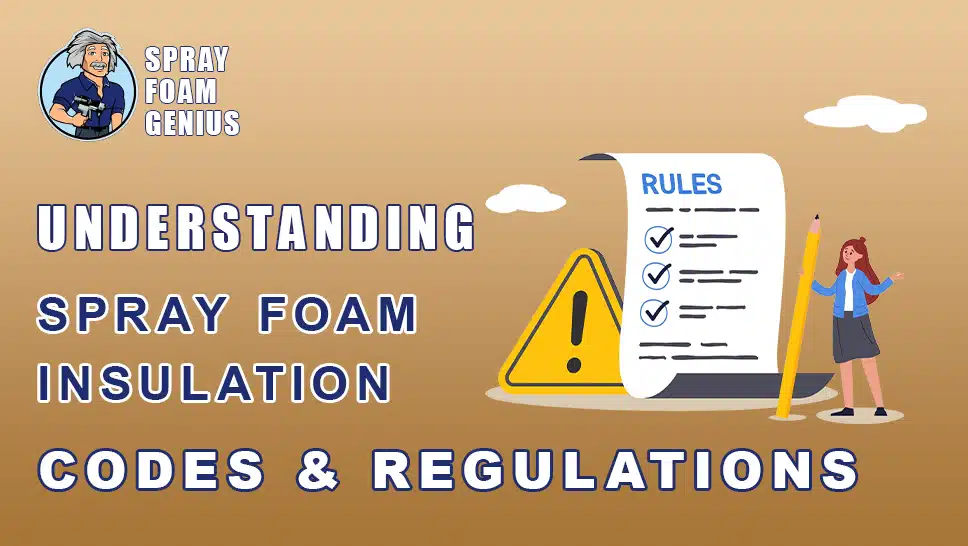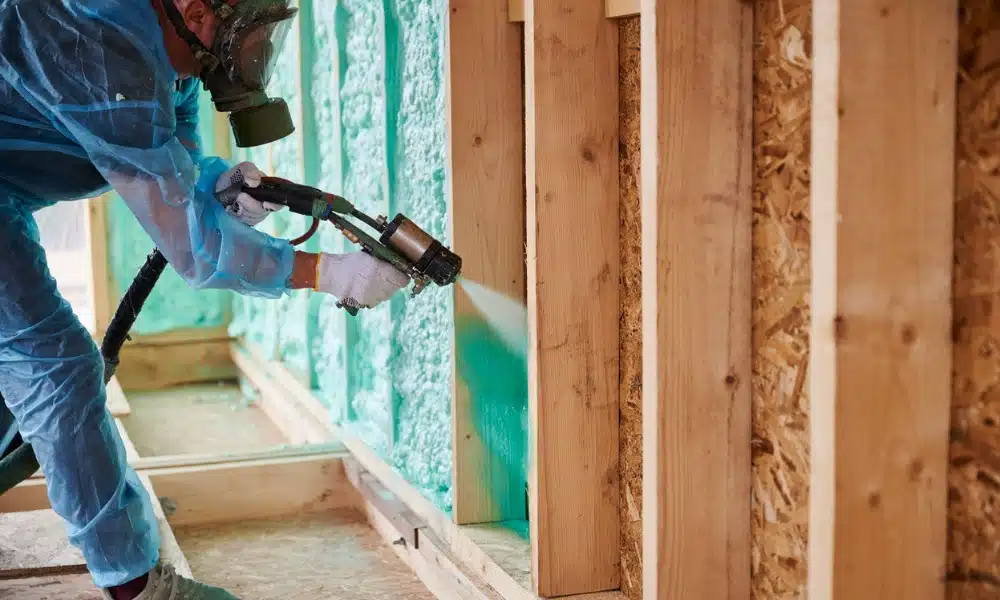
Why Compliance Matters for Insulation Contractors
Staying compliant with Spray Foam Insulation codes and regulations is essential for insulation contractors across the USA and Canada. These guidelines ensure that installations meet safety, performance, and environmental standards. Non-compliance can result in fines, project delays, or even business shutdowns. Understanding and following the latest building codes can enhance a contractor’s reputation, increase customer trust, and lead to more business opportunities.
As experts in marketing exclusively for insulation professionals, we recognize the importance of compliance in your industry. By understanding the regulations that govern insulation projects, contractors can confidently navigate their market, attract quality clients, and reduce legal risks.
Key Insulation Codes and Regulations
1. International and National Building Codes
Both the USA and Canada follow strict insulation codes that dictate how materials should be installed and what performance standards they must meet. Here are the primary codes governing insulation projects:
United States
- International Building Code (IBC): Sets the foundation for construction regulations, including insulation requirements.
- International Energy Conservation Code (IECC): Focuses on energy efficiency and dictates insulation performance standards.
- ASHRAE 90.1: Establishes minimum energy efficiency requirements for buildings.
- NFPA 286 & NFPA 285: Addresses fire safety and flammability requirements for insulation materials.
- State-Specific Codes: Many states adopt variations of national codes, requiring contractors to stay updated on local amendments.
Canada
- National Building Code of Canada (NBC): Outlines general building requirements, including insulation specifications.
- National Energy Code for Buildings (NECB): Sets efficiency standards for commercial and residential structures.
- CAN/ULC Standards: Provides additional guidelines for insulation materials, fire resistance, and application methods.
- Provincial Building Codes: Some provinces, such as Ontario and British Columbia, have their own insulation regulations.
2. Fire Safety and Flammability Regulations
Fire safety is one of the most critical aspects of insulation installation. Improperly installed insulation can become a fire hazard, making it crucial for contractors to understand fire safety codes.
- NFPA 286 (USA) & CAN/ULC-S102 (Canada): Standards for flame spread and smoke development.
- Thermal Barriers & Ignition Barriers: Required in certain applications to prevent direct exposure to flames.
- ASTM E84 & CAN/ULC-S127: Tests to evaluate flame spread and fire resistance.
To remain compliant, insulation contractors must always verify that their materials and installation methods meet these fire protection guidelines.
3. Environmental and Energy Efficiency Standards
Energy codes are becoming stricter as governments push for lower carbon emissions and increased energy efficiency. Contractors must ensure that their projects align with these sustainability goals.
- R-Value Requirements: Insulation must meet minimum R-value standards, which vary by climate zone.
- Air Sealing and Vapor Barriers: Proper air sealing techniques improve energy efficiency and prevent moisture-related issues.
- Low-VOC and Eco-Friendly Materials: Many regions now encourage or require the use of environmentally friendly insulation options.
Contractors who stay ahead of these evolving regulations can market their services as energy-efficient solutions, appealing to environmentally conscious customers.
4. Permits and Inspection Requirements
In both the USA and Canada, insulation projects often require permits and inspections to verify compliance with building codes. These steps ensure that installations meet performance and safety standards.
- Permit Requirements: Some jurisdictions require permits before beginning an insulation project.
- On-Site Inspections: Inspectors assess insulation thickness, application methods, and fire protection measures.
- Documentation & Certification: Contractors may need to provide product certifications or manufacturer compliance documents.
Failure to obtain the necessary permits or pass inspections can result in costly fines and project delays.
5. Industry Certifications and Best Practices
Beyond legal codes, industry certifications can set a contractor apart and build customer trust. Obtaining these credentials demonstrates expertise and commitment to best practices.
Popular Certifications
- SPFA PCP Certification (USA): Verifies a contractor’s knowledge of insulation installation and safety.
- CUFCA Certification (Canada): Recognized for quality control in insulation projects.
- BPI Certification: Focuses on energy efficiency and home performance.
- LEED Accreditation: Showcases expertise in green building and sustainability.
Many customers look for certified professionals when hiring a contractor, so investing in training and certification can be a competitive advantage.
Ensuring Compliance and Avoiding Pitfalls

To stay compliant and avoid penalties, insulation contractors should follow these best practices:
Stay Updated on Code Changes
Building codes are frequently revised to reflect advancements in safety and energy efficiency. Contractors should regularly review local and national regulations to stay ahead of industry changes.
Work with Certified Suppliers
Using code-compliant materials from reputable manufacturers ensures that projects meet required standards. Always verify that insulation materials have proper testing certifications.
Maintain Proper Documentation
Keeping detailed records of projects, including materials used and application methods, can protect contractors in case of disputes or inspections.
Invest in Training
Continuous education on code requirements, fire safety measures, and energy efficiency practices can improve installation quality and compliance.
Hire a Compliance Consultant
For large-scale projects, working with a compliance expert can help ensure that all aspects of an insulation project meet regulatory requirements.
Get Compliant and Stay Ahead of the Competition
As insulation contractors, staying up to date with regulations isn’t just about avoiding fines—it’s a way to build credibility and attract more clients. Compliance ensures safe, high-quality installations that enhance customer trust and industry reputation.
If you need help positioning your business as a leader in the industry, we can help. Our marketing strategies ensure that insulation contractors get found by the right clients while maintaining compliance with industry standards.
Call Spray Foam Genius Marketing at 877-840-FOAM for the USA or 844-741-FOAM for Canada, visit our website at sprayfoamgeniusmarketing.com, or email us at [email protected] to get started.
Frequently Asked Questions
1. What are the key insulation codes that contractors must follow?
Insulation contractors must comply with the International Building Code (IBC), International Energy Conservation Code (IECC), and state/provincial building codes. Fire safety regulations, such as NFPA 286 (USA) and CAN/ULC-S102 (Canada), are also critical.
2. How can insulation contractors ensure compliance with fire safety regulations?
Contractors should use code-compliant materials, follow manufacturer guidelines, and install proper thermal or ignition barriers when required. Keeping up with fire safety standards such as ASTM E84 and NFPA 285 is essential.
3. Are there different insulation requirements based on climate zones?
Yes, insulation requirements vary by climate zone. R-value requirements differ based on location, with colder regions requiring higher insulation performance. Contractors should refer to local energy codes for specific guidelines.
4. Do insulation contractors need specific certifications?
While not always mandatory, certifications such as SPFA PCP (USA) and CUFCA (Canada) enhance credibility and demonstrate expertise. Other certifications like BPI and LEED accreditation can also be beneficial.
5. What are the penalties for non-compliance with insulation codes?
Penalties for non-compliance include fines, failed inspections, project delays, and potential legal actions. In severe cases, contractors may face business shutdowns or lawsuits from property owners.
- 5 Google My Business Hacks to Double Your Leads for Spray Foam Insulation Contractors - January 14, 2025
- Why Spray Foam Contractors Cannot Ignore Reputation Management in 2025 - January 13, 2025
- Local SEO Secrets Every Spray Foam Contractor Must Know to Win in 2025 - January 13, 2025

